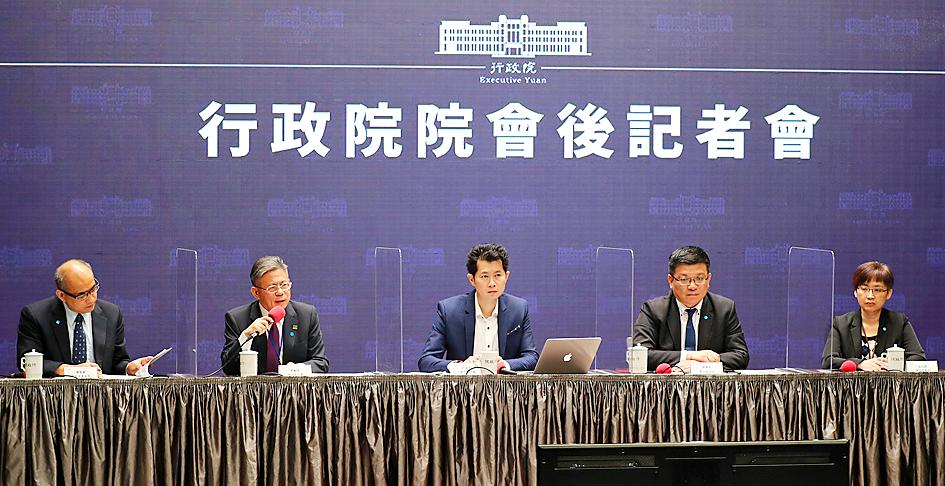Premier Su Tseng-chang (蘇貞昌) yesterday approved a revised NT$6.6 billion (US$219.67 million) subsidy program to aid university graduates seeking employment or undergoing job training.
The program would give graduates NT$20,000 for staying at a job for three months, while those holding a position for six consecutive months would receive NT$30,000, said Shih Chen-yang (施貞仰), deputy director-general of the Ministry of Labor’s Workforce Development Agency.
University graduates who enter construction, manufacturing or skilled nursing would be eligible for a special subsidy of NT$5,000 per month for the first six months, NT$7,000 for the following six months and NT$8,000 for an additional six months, she said, adding: “The ministry seeks to attract 2,000 graduates to construction, manufacturing and nursing.”

Photo: CNA
The ministry would also pay the tuition of graduates who enroll in its training programs for green energy, information technology, machinery, electrical engineering and other sectors, up to NT$100,000 per person, Shih said.
Graduates who join training programs designed as part of the Cabinet’s “five plus two” innovative industries plan would receive NT$8,000 per month for up to 12 months, while those who enroll in other training programs would receive NT$3,000 per month for up to 12 months, she added.
The ministry hopes to recruit 15,000 graduates to join the training programs, she said.
Companies that provide on-the-job training to employees who graduate this year would receive NT$12,000 per trainee, up to NT$108,000, she said.
If the unemployment rate among university graduates continues to rise, the ministry would implement a program to pay employers up to NT$80,000 over 12 months if they hire a university graduate with a monthly salary of at least NT$28,000, Shih said.
Regarding the size of the subsidy package, which is smaller than the one that the ministry proposed last month, Deputy Minister of Labor Lin San-quei (林三貴) said that the amount had been trimmed after the program was adjusted to reflect the number of students set to graduate this summer, and to allow subsidies to trickle down to employees rather than being predominantly paid to employers.
The program is designed to benefit 140,000 graduates, he said, citing the ministry’s estimate, which excludes students that might move abroad, pursue a higher degree or serve in the military rather than pursue employment.

South Korean K-pop girl group Blackpink are to make Kaohsiung the first stop on their Asia tour when they perform at Kaohsiung National Stadium on Oct. 18 and 19, the event organizer said yesterday. The upcoming performances will also make Blackpink the first girl group ever to perform twice at the stadium. It will be the group’s third visit to Taiwan to stage a concert. The last time Blackpink held a concert in the city was in March 2023. Their first concert in Taiwan was on March 3, 2019, at NTSU Arena (Linkou Arena). The group’s 2022-2023 “Born Pink” tour set a

CPBL players, cheerleaders and officials pose at a news conference in Taipei yesterday announcing the upcoming All-Star Game. This year’s CPBL All-Star Weekend is to be held at the Taipei Dome on July 19 and 20.

The Taiwan High Court yesterday upheld a lower court’s decision that ruled in favor of former president Tsai Ing-wen (蔡英文) regarding the legitimacy of her doctoral degree. The issue surrounding Tsai’s academic credentials was raised by former political talk show host Dennis Peng (彭文正) in a Facebook post in June 2019, when Tsai was seeking re-election. Peng has repeatedly accused Tsai of never completing her doctoral dissertation to get a doctoral degree in law from the London School of Economics and Political Science (LSE) in 1984. He subsequently filed a declaratory action charging that

The Hualien Branch of the High Court today sentenced the main suspect in the 2021 fatal derailment of the Taroko Express to 12 years and six months in jail in the second trial of the suspect for his role in Taiwan’s deadliest train crash. Lee Yi-hsiang (李義祥), the driver of a crane truck that fell onto the tracks and which the the Taiwan Railways Administration's (TRA) train crashed into in an accident that killed 49 people and injured 200, was sentenced to seven years and 10 months in the first trial by the Hualien District Court in 2022. Hoa Van Hao, a